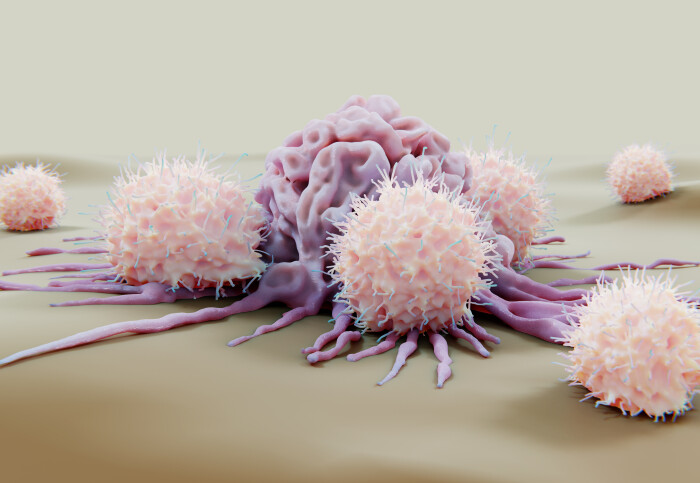Natural killer cell therapy under development by new Imperial startup

Natural killer cells can be directed to attack cancer cells
Harnessing specialised cells from the body’s immune system promises cheaper, more effective cancer treatments.
A new Imperial startup is developing a cell therapy based on immune cells known as natural killer (NK) cells that the company believes could prove effective for treating solid tumour cancers.
The company, NK:IO, was founded in 2020 to build on Imperial research, and has launched publicly with the announcement of a £1.6 million Innovate UK grant that it will use to progress its cellular immunotherapy platform toward clinical adoption.
Our approach is potentially transformational. We will deliver an off-the-shelf product, potentially at a fraction of the cost of some T-cell therapies. Professor Hugh JM Brady Co-founder, NK:IO
Cellular immunotherapy is a new form of medicine that involves taking immune cells from the body, cultivating them, and using them to treat conditions such as cancers. This is sometimes assisted by genetic modifications that help the cultivated immune cells recognise the cancer cells.
Versions of this approach based on T-cells have already entered clinical use after being proven safe and effective in treating some blood cancers. However, the therapies have to be produced in a bespoke way for every patient, making them expensive, and they have not been proven effective for treating solid tumours.
Off-the-shelf treatment
NK cells differ from T-cells because they are part of the innate immune system, meaning they can identify foreign invaders such as cancer cells without needing extra help such as genetic modification. This means a cell therapy based on NK cells could in principle be produced as an off-the-shelf treatment at lower cost.

“Our approach is potentially transformational," said co-founder Professor Hugh JM Brady. “We will deliver an off-the-shelf product, potentially at a fraction of the cost of some of the T-cell therapies. The main advantage of NK cells is that they will they be truly allogeneic – the right treatment for all. There might be a bit of matching in precise cells and precise patients, but nothing like what is required for T-cells.”
Many companies and research teams around the world are focusing efforts on producing cell therapies based on NK cells, but a key challenge is to find techniques for cultivating effective versions of the cells. NK:IO, which is backed by decades of research by its academic founders, Professor Brady (Department of Life Sciences) and Professor Matthew Fuchter (Chemistry), will use a platform that uses small molecules and chains of amino acids known as peptide ligands to turn stem cells into NK cells.

The founders say that, compared to other approaches under development, their method is more effective at producing NK cells, and will produce NK cells that are more effective at fighting cancers.
“Our hypothesis is that the cells should be far more effective,” said Professor Fuchter. “Through the pathway we utilise, we make cells that are highly active. Standard methodology makes cells with exhaustion phenotype – they don’t survive long or recruit immune system well.”
The company also plans to use its technique to genetically engineer its NK cells to make them more effective against hard-to-treat solid tumour cancers.
Preclinical development
It will use its Innovate UK funding, which it has received under the BioMedical Catalyst ‘New Cancer Therapeutics’ programme, to support the scale-up and pre-clinical development of its NK cell therapy candidates in a project run in collaboration with the UK’s Cell and Gene Therapy Catapult.
To date, NK:IO's work has been R&D-heavy, but the team is now ready scale-up and capitalise on the research. Dr James Groves Head of Investment Services, Imperial
“We are very excited by the potential of NK:IO’s platform to address unmet needs in cancer therapy and delighted to receive grant funding from this highly competitive new Innovate UK programme," said Mike Romanos, Co-Founder and Interim CEO at NK:IO.
"The funding will directly support our collaboration with the Cell and Gene Therapy Catapult in a programme of development work to scale our products and make them clinic-ready for our first clinical application in ovarian cancer,” he added.
Dr James Groves, Head of Investment Services at Imperial and NK:IO Board Observer said: “NK:IO was founded on key biological discoveries regarding the cellular pathways of NK cells. This provided the company an advantage regarding the limitations of NK-mediated cancer therapies faced by their competitors. To date, work has been R&D-heavy, but the team is now ready scale-up and capitalise on the research.”
Main image: Juan Gaertner/Science Photo Library
Article text (excluding photos or graphics) © Imperial College London.
Photos and graphics subject to third party copyright used with permission or © Imperial College London.
Reporter
David Silverman
Communications Division